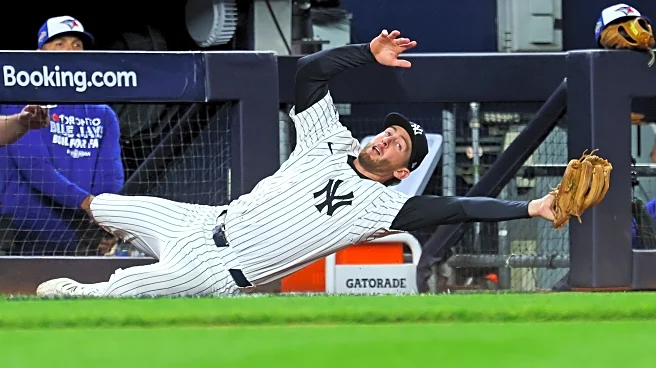There’s plenty of blame to go around for the Yankees’ season-ending loss to the Blue Jays last night. Anthony Volpe looked overmatched, striking out in each of his three plate appearances. Austin Wells went oh-fer, too, including a first-pitch lazy fly ball with the bases juiced in the eighth that felt like a last gasp. A gut punch of an error by Jazz Chisholm Jr. on a tailor-made double-play ball in the seventh led to two crucial insurance runs. As ever, you’re free to second-guess managerial decisions
with regard to the lineup and bullpen to your heart’s delight.
Just don’t blame Ryan McMahon.
Upon coming aboard at the trade deadline, the third baseman filled an obvious area of need, replacing Oswald Peraza at the hot corner. Given his predecessor’s .152 batting average and 24 OPS+ through 170 plate appearances, the bar was set pretty low. In what had been a career spent entirely in the purgatory that is Colorado baseball, McMahon had shown some pop, finishing with at least 20 homers in each of his five full seasons with the Rockies (a mark he matched for a sixth time this year).
But the veteran’s calling card had become his defense. McMahon accumulated 78 Defensive Runs Saved and 39 Outs Above Average in Colorado, finishing third among all third basemen in the latter metric between 2021-2024. And, while he hit just .208 in 185 regular-season plate appearances with New York, McMahon quickly endeared himself to Yankees fans through his superlative glove. That general trend continued into the playoffs — in the Wild Card Series and first three games of the ALDS, he went 3-for-12 with no extra-base hits but turned the hot corner into a no-fly zone, most notably via a memorable play in which he tumbled into the visitors’ dugout while helping preserve Cam Schlittler’s eight innings of shutout ball against the Red Sox in Game 3 of the Wild Card Series. Penciled into the nine hole for yesterday’s do-or-die game against Toronto, the expectation remained that McMahon would provide Gold Glove-caliber defense, with any offensive output an added bonus. When he came to the plate in the bottom of the third, with the Yankees down 1-0 in the early going, he did more than hold serve.
In a planned bullpen game, the lefty Mason Fluharty relieved opener Louis Varland and punched out Austin Wells and Anthony Volpe in short order to close out the second. It was a mismatch for McMahon as he led off the following inning. Fluharty, a southpaw who held left-handed opponents to a .182 average as a rookie phenom, against McMahon, the lefty hitter who managed just a .184 average against lefty pitchers. He started the at-bat with a foul bunt and followed by swinging through a sweeper, staking Fluharty to a quick 0-2 count. The 30-year-old persisted, taking three pitches and fouling off a fourth to draw the count full. On the seventh pitch (and sixth sweeper) of the at-bat, McMahon yanked a pitch on the outside corner towards right field in a loping swing reminiscent of Kirk Gibson’s iconic walk-off blast in Game 1 of the 1988 World Series. The ball soared 357 feet over the fence for a game-tying homer, the veteran’s first long ball in 18 playoff plate appearances.
It was all the offense the Yankees would be able to muster until the ninth in a disheartening, 5-2 defeat. The dinger wasn’t McMahon’s only contribution of the night, as he’d also recover nicely to make a slick, sliding play on a foul ball off the bat of Anthony Santander to open the seventh when the game was still tight at 2-1.
He was pulled for the right-handed Amed Rosario in the bottom of the seventh, ending his day early. There was one more reminder of the former All-Star in his absence, when Alejandro Kirk laced a grounder down the third-base line that scooted past a diving Rosario but on which McMahon plausibly would have had a play had he still been in the game. By the time Kirk came around the score, the Yankees were down four as they watched a once-promising season slip away. Ryan McMahon did his job last night. It wasn’t nearly enough.


















